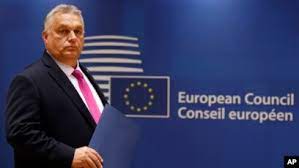EU expresses doubts on long-term funding for Ukraine

Brussels: European Union countries are having reservations about committing a long-term fund of $21.4 billion of military aid for Ukraine as its grinding fight continues against Russia’s invasion.
EU defense ministers prepared to discuss the plan Tuesday in Brussels proposed by EU foreign policy chief Josep Borrell last July. However, diplomats say multiple countries — including Germany — have voiced reservations about committing up to $5 billion annually over four years as part of broader Western security commitments to bolster Ukraine’s defenses.
The EU already has provided aid of arms and equipment worth $26 billion, according to the bloc’s diplomatic service.
“Germany has had a lot of questions … and rightfully so. We’re talking about a lot of money,” said a senior diplomat, who remained anonymous.
The debate over military aid comes as EU nations are also debating a proposal to give Ukraine almost $54 billion in economic assistance.
Some EU members have also argued they will struggle to make a big long-term pledge as domestic budgets are squeezed.
“For some member states, there is the reality of the public finances,” said a second EU diplomat.
Additionally, the EU is also facing challenges meeting a target of supplying Kyiv with 1 million artillery shells and missiles by March next year.
Hungary has for months been holding up more than $500 million in payouts from the Peace Facility to EU members for Ukraine aid over Ukraine’s blacklisting a Hungarian bank, OTP.
Since the bank was removed from the blacklist, Hungary has been insisting it wants guarantees it will not return there.
Hungary’s Prime Minister Viktor Orbán said Friday he does not support moving forward on negotiations about Ukraine’s accession in the European Union, signaling that his country could be an obstacle to Kyiv’s ambitions to join the bloc.
Unanimity among all member states is required to admit a new country into the bloc, giving Orban a powerful veto.
In an interview with state radio Friday, Orban said Ukraine is nowhere near gaining membership in the world’s largest trading bloc.
“The clear Hungarian position is that the negotiations must not begin,” he said.
Orban’s government has refused to supply Ukraine with weapons in its war against Russia. It also accuses Ukraine of violating the rights of an ethnic Hungarian minority in western Ukraine by restricting its use of the Hungarian language in schools.
On Friday, Ukrainian naval drones sank two small Russian landing boats in Crimea, according to Ukraine’s military intelligence agency.
There was no immediate comment by Russia, whose Black Sea Fleet is headquartered in the Crimean city of Sevastopol.
An initial report from military intelligence said the two small, amphibious Russian ships had been hit overnight.
“As a consequence of the attack, both vessels went to the bottom, the Akula straight away and the Serna after attempts to save it,” the report said.
The Ukrainian military said the vessels were manned and loaded with armored vehicles. Ukraine says some Russian navy vessels have relocated from Sevastopol following recent attacks.
Russian artillery and drone attacks Friday killed three people and damaged an unspecified infrastructure facility, power lines and a gas pipeline in the Dnipropetrovsk and Kherson regions, local officials said.
Both regions come under regular shelling by Russian troops in occupied territory on the eastern bank of the Dnipro River.
In Nikopol, Dnipropetrovsk region, a 67-year-old woman was killed in an afternoon drone attack, Serhiy Lysak, the governor, said on the Telegram messaging service.
“A 68-year-old man received shrapnel wounds. He’s hospitalized,” Lysak added on Telegram.
Images from the site shared by Lysak showed buildings with shattered windows, huge holes in the walls, and a burnt car. An infrastructure facility, a gas pipeline and power lines, as well as 11 private houses, had been damaged.
In Kindiyka, Kherson region, shelling Friday morning killed a 69-year-old man and injured another 63-year-old, Governor Oleksandr Prokudin said on Telegram.
He later wrote that a 61-year-old man was also killed and five more injured in a separate shelling in Novoraysk.
Russian President Vladimir Putin visited his southern military headquarters in Rostov-on-Don late Thursday assessing the state of his country’s forces in Ukraine as the war drags on toward winter.
It was Putin’s second public visit to the headquarters in less than a month.
He was accompanied by Defense Minister Sergei Shoigu and Valery Gerasimov, chief of the general staff. After almost 21 months of fighting in Ukraine, both Russia and Ukraine’s military resources have been significantly eroded. With winter looming, the fighting is likely to further settle into attritional warfare.





